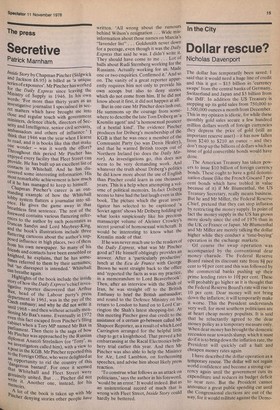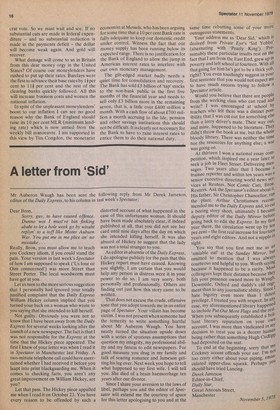In the City
Dollar rescue?
Nicholas Davenport
The dollar has temporarily been saved. I said that it would need a huge line of credit and this it got — $15 billion in 'currency swaps' from the central banks of Germany, Switzerland and Japan and $5 billion from the IMF. In addition the US Treasury is stepping up its gold sales from 750,000 to 1,500,000 ounces a month from December. This in my opinion is idiotic, for while these monthly gold sales secure a few hundred million dollars worth of foreign currencies they depress the price of gold (still an important reserve asset) — it has now fallen from $240 to $210 an ounce — and they don't mop up the billions of dollars which an issue of gold convertible bonds would have done.
The American Treasury has taken powers to issue $10 billion of foreign currency bonds. These ought to have a gold denomination clause (like the French Giscard 7 per cent bonds which have trebled in value because of it) if Mr Blumenthal, the US Treasury Secretary, really means business. But he and Mr Miller, the Federal Reserve Chief, pretend that they can stop inflation by restricting the money supply. In point of fact the money supply in the US has grown more slowly since the end of 1976 than in the UK or France or Japan. Mr Blumenthal and Mr Miller are merely talking the dollar higher while they conduct a 'time-buying' operation in the exchange markets.
Of course the swap operation was accompanied by the conventional dear money charade. The Federal Reserve Board raised its discount rate from 84 per cent to 9i per cent and this was followed by the commercial banks pushing up their prime lending rates to 10i per cent. These will probably go higher as it is thought that the Federal Reserve Board's rate will rise to 10 per cent. Dear money will not bring down the inflation; it will temporarily make it worse. This the President understands very well, for most southern politicians are at heart cheap money populists. It is said that he reluctantly agreed to the dear money policy as a temporary measure only. When dear money has brought the domestic recession near towards slump, which it must do If it is to bring down the inflation rate, the President will quickly call a halt and cheapen money rates again.
I have described the dollar operation as a temporary rescue. The dollar will not regain world confidence and become a strong currency again until the government cuts its expenditure and reduces its budget deficit to near zero. But the President cannot announce a great public spending cur until the Congressional elections are out of the way, for it would militate against the Demo crat vote. So we must wait and see. If no substantial cuts are made in federal expenditure — and no substantial reciiiction is made in the payments deficit — the dollar will become weak again. And gold will recover.
What damage will come to us in Britain from this dear money orgy in the United States? Of course our moneylenders have rushed to put up their rates. Barclays were the first to advance their base rates by liner cent to 11i per cent and the rest of the clearing banks quickly followed. All this will increase business costs and worsen the national inflation.
In spite of the unpleasant moneylenders' boost to our inflation I can see no good reason why the Bank of England should raise its 10 per cent MLR (minimum lending rate) which is now untied from the weekly bill manoeuvre. I am supported in this view by Tim Congdon, the monetarist economist at Messels, who has been arguing for some time that a 10 per cent Bank rate is fully adequate to keep our domestic credit under control. Witness the fact that our money supply has been running below its expected range. There is no justification for the Bank of England to allow the jump in American interest rates to interfere with our own monetary management.
The gilt-edged market badly needs a quiet time for consolidation and recovery. The Bank has sold £3 billion of 'tap' stocks to the non-bank public in the first five months of the financial year and needs to sell only £3 billion more in the remaining seven, that is, a little over £400 million a month. With a cash flow of about £700 million a month accruing to the life, pension and other savings institutions this should not be difficult. It is clearly not necessary for the Bank to have to raise interest rates to entice them to do their national duty.



































 Previous page
Previous page